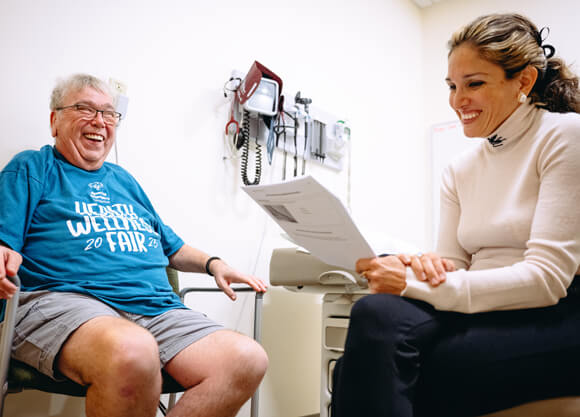
Quinnipiac SPAC training program teams up with Special Olympics Connecticut athletes
June 24, 2025

June 24, 2025

Within the school’s Standardized Patient and Assessment Center (SPAC), standardized patients are trained to play the roles of patients, family members, healthcare providers or others in a consistent fashion, for the purposes of providing students with critical clinical simulation and experiential learning interactions. Expert patients who participate in the program share their real-life experiences. Both types of patients enter SPAC exam rooms to help students practice history-taking skills, physical exam skills, communication skills and more.
Training Special Olympic Connecticut adult athletes in SPAC patient roles can help students to gain experience so they may best assist people with intellectual and developmental disabilities. As SPAC simulates a real-world clinical learning environment, enhancing its expert and standardized patient roster to include those with differing abilities exposes students to valuable real-world interactions, said SPAC Director Gabby Ceccolini.
Working with Special Olympics Connecticut Health & Wellness Director Caitlin Daikus, Ceccolini coordinated the one-day inaugural training event on the North Haven Campus on June 16. A grant from Special Olympics International helped to fund the program.
“It’s a win-win, because our students are seeking a diversity of patients to be better prepared for the real world, and we already have a great relationship with the Special Olympics athletes who help our medical students during an event, working with individuals with intellectual and/or developmental disabilities. The athletes come as themselves, and the students interact with them,” Ceccolini said. “But many of the athletes are really excited when they see the exam rooms and they want to do more. So we’ve developed this training day as a first step to see if we can provide a little more of our standardized patient training to these Special Olympic athletes.”
Daikus said the program adds yet another layer to the many collaborative programs that have developed during the six years of partnership.
“We have a great partnership with Quinnipiac’s Frank H. Netter School of Medicine. This partnership has grown to where now we’re partnering with other areas such as the physical therapy program and other programs, and it’s really stemmed from the partnership with the medical school,” said Daikus.
Daikus, who oversees all Special Olympics Connecticut health and fitness programming, noted that the seven athletes participating in the special training session are Special Olympics Connecticut Health Messengers. As such, they are passionate advocates for their community and for inclusiveness in healthcare.
“They are spokespersons for Special Olympics, but in particular for advocating for equitable access to healthcare services for people with intellectual and developmental disabilities,” Daikus said. “These athletes that are here today have been trained to train students on how to interact with people with disabilities, and how to treat people with disabilities. Their goal is just for a more inclusive world within the health care system.”
The athletes, ranging in age from approximately 25 to 45, were instructed by SPAC Standardized Patient Coordinator Jean Kappes, who provided a modified standardized patient training format. Additionally, the athletes engaged in one-on-one modeling enacted by current SPAC standardized patients, who also acted as medical students for the athletes during the exam room portion of the training.
The special SPAC training event was supervised by Traci Marquis-Eydman, MD, associate professor of medical sciences and program director for Quinnipiac's Rural Family Medicine Residency Program.
Marquis-Eydman offers an elective for fourth-year medical students on the care of individuals with Intellectual and/or Developmental Disabilities (IDD) and helps oversee improving comfort, skills and understanding of care of persons with IDD in curriculum across all four years.
“What makes this different from previous sessions is that we’re training the athletes themselves to become expert patients and standardized patients. It’s actually learning how to play a role, and also how to give feedback to the students in a very specific way. Our athletes are super excited about it and so are we,” said Marquis-Eydman.
Among other university medical schools, such attention to incorporating IDD in curricula and through unique programs such as this is a differentiator for Quinnipiac’s Frank H. Netter School of Medicine.
“I think we’re actually unique and ahead of the curve on this,” said Marquis-Eydman. “There has been a push in the last four or five years to increase the presence of IDD in the curricula across medical schools, but it’s still early in that phase. I feel we stand out with just the curriculum, however, by including our Special Olympics athletes and health messengers as standardized patients, we’re way ahead of the curve.”
Quinnipiac Today is your source for what's happening throughout #BobcatNation. Sign up for our weekly email newsletter to be among the first to know about news, events and members of our Bobcat family who are making a positive difference in our world.
Sign Up Now